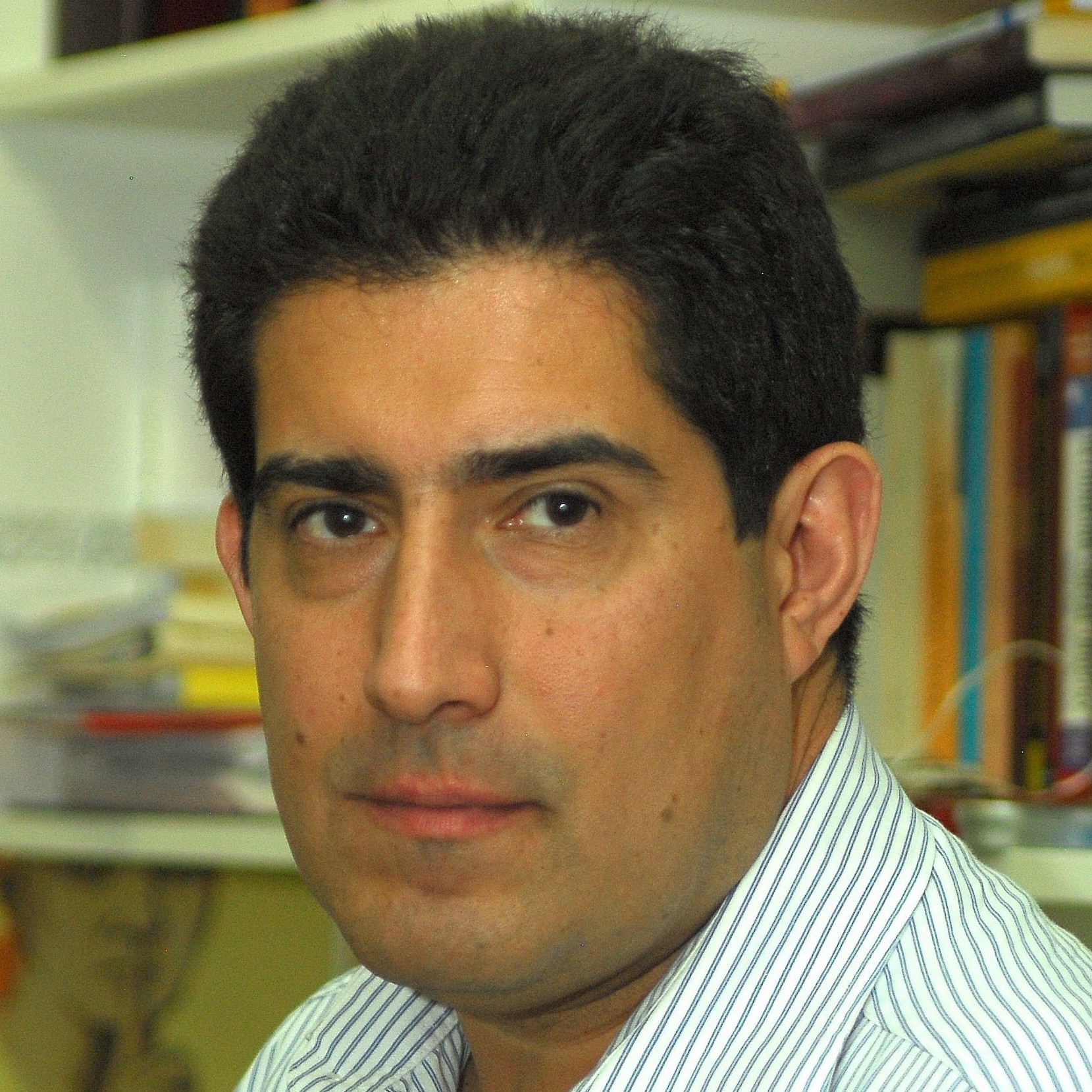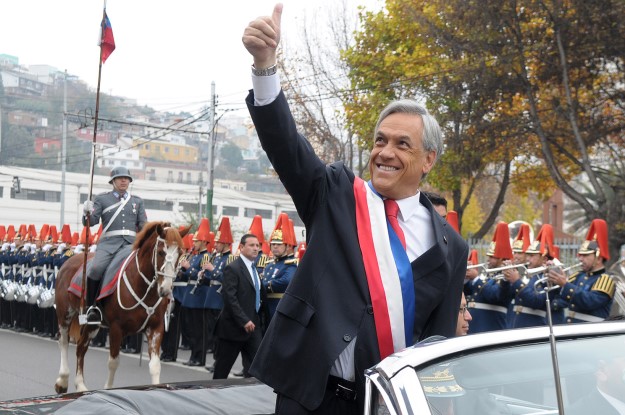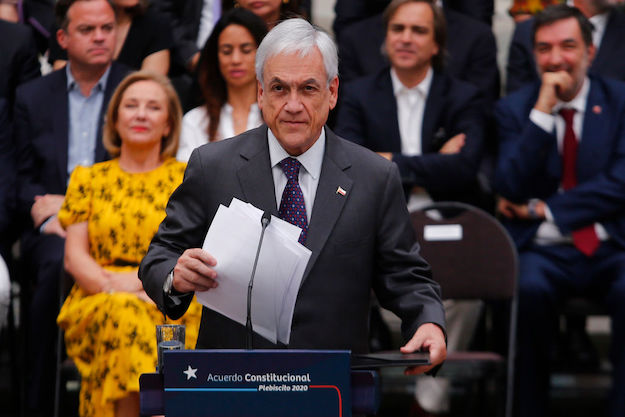Eight months before Chileans go to the polls, former President Sebastián Piñera is the frontrunner among a crowded field of candidates. The center-right businessman who was president from 2010 to 2014 leads public opinion polls, and has clearly benefited from the unpopularity of Michelle Bachelet, who preceded him in power – and replaced him when his term ended in 2013.
If Piñera returns, it would be an amazing comeback – and the latest surprising chapter in a career full of ups and downs.
A 67-year old economist who is also Chile’s sixth-wealthiest person, Piñera has enjoyed success in business and politics. After getting a Ph.D. in Economics at Harvard, Piñera returned to Chile in the early 1980s. He briefly worked as an academic, but soon began his own private ventures, bringing credit cards to Chile. At the time, the dictatorship of Augusto Pinochet (1973-1990) was opening up the economy. Though Piñera benefited from the market-friendly reforms, he kept his distance from the authoritarian government. In 1988, he quietly supported the democratic opposition that defeated Pinochet in the plebiscite. But in 1989, Piñera was elected senator representing the right-wing coalition comprised by parties that had previously supported Pinochet. During his eight years in the Senate, Piñera actively participated in legislative debates, brokering deals with the center-left Concertación government to make the market-friendly neoliberal economic system more inclusive. At the same time, Piñera expanded his business empire. As one of the key shareholders of the privatized LAN airline, Piñera began to accumulate a sizable fortune.
A 1992 political scandal associated with surveillance of right-wing political leaders conducted by the military (though he stepped down from the presidency, Pinochet remained commander-in-chief of the army until 1998) cut Piñera’s presidential ambitions short. After one term in the Senate, Piñera did not seek re-election and focused on his multiple business interests. He remained active in politics, though, as leader of National Renewal, a moderate right-wing opposition party. In 2005, Piñera surprisingly entered the presidential race and edged a more conservative rival to qualify for the runoff against Socialist Michelle Bachelet. Piñera lost the runoff, but remained the most popular presidential hopeful until he was able to become the first right-wing president of Chile, when he won elections in 2010.
His four-year term was characterized by moderate policies and intense social protests—particularly among students who demanded a stronger public sector role in education. The economy expanded under Piñera, but a number of scandals – including a failed census in 2012 and tampering with the national poverty indicator survey – damaged his reputation. The student protests and other social mobilization helped bring his approval rating down. Though the country grew under his watch and unemployment and poverty declined, Piñera was the most unpopular president since the restoration of democracy.
His transformation into the frontrunner for the November 2017 election has a lot to do with the disastrous administration led by Michelle Bachelet. Swept into office with 62 percent of the votes in the 2013 runoff election, Bachelet sought to implement profound reforms in Chile. Falling export commodity prices hurt the economy, and the tax, labor and institutional reforms Bachelet implemented scared economic actors. A series of political scandals damaged the entire political class’ reputation, and business ventures of Bachelet’s son and daughter-in-law damaged her reputation. Now, Bachelet is the least popular president in Chile’s history and, by contrast, Piñera looks rather attractive. Though he struggled with approval as president, the economy expanded and people did well. Chileans might not like him much, but they remember that under Piñera there were jobs and growth and now, under the much more personable Bachelet, the economy is stagnant.
Bachelet’s troubles have extended to her center-left Nueva Mayoría coalition. The unpopularity of the reforms championed by the government have caused tension between the moderate and leftist wings. As some advocate for deepening Bachelet’s reforms and others call for a return to the moderate and pragmatic first 20 years of democracy (1990-2010), the Nueva Mayoría’s future is uncertain. While Piñera is likely to cruise to a victory on the July 2 presidential primaries of his right-wing Chile Vamos coalition, the center-left Nueva Mayoría might end up breaking and having two or three presidential candidates in November. As there are other candidates further to the left of Nueva Mayoría hoping to run, Piñera might end up facing a divided left wing in the campaign.
Polls show Piñera with a comfortable advantage, but the race is just beginning and about half of Chileans are still undecided. All presidential elections in the past have shown that the left-wing candidate gets a solid vote share in the runoff as many Chileans coalesce behind whomever can stop the political righ t– where many former Pinochet supporters continue to hold sway.
Still, Chile seems poised to follow on the trajectory of other South American countries that have shifted right in recent elections. After the election of Mauricio Macri in Argentina in late 2015, the left has lost presidential elections in Peru, legislative elections in Venezuela, municipal elections in Brazil and Chile and a referendum in Bolivia (the presidential runoff election in Ecuador is heading to a close vote on April 2).
Though the campaign is just beginning, Chile looks headed for a new defeat for the Latin American left as voters seem inclined to put Piñera back in the La Moneda presidential palace.
—
Navia is a a contributing columnist for Americas Quarterly, professor of liberal studies at NYU and professor of political science at Diego Portales University in Chile









